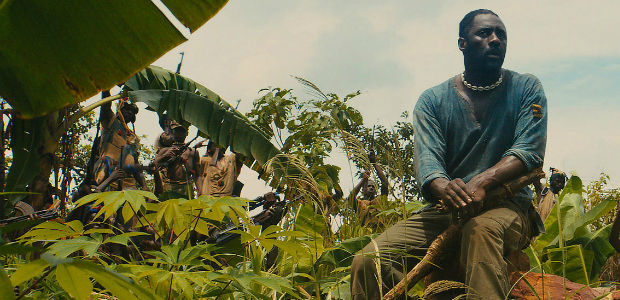An unrelenting, violent film, Cary Fukunaga’s Beasts of No Nation opens not with gunshots, or screaming, but with the sounds of childhood laughter. When young Agu (Abraham Attah) has his happy life and family torn apart by an unspecified African civil war, he flees into the jungle to an almost certain death. Through a series of unfortunate events, he finds himself recruited by the rebel Native Defense Force, and falls under the command of the mysterious yet magnetic Commandant (Idris Elba). What follows is a movie about the nature of family, love, and the way in which war can blacken a once-pure soul.
The film does not concern itself with the politics or rationale behind the ambiguous civil war in an unnamed African country, and it gets bogged down during the few times that it does. Agu’s point-of-view and the audience’s point-of-view are immediately one and the same; the nature of the conflict and the looming danger early in the film are communicated through worried looks on the faces of adults, and bits of radio broadcast.
From there, this young character begins to lose everyone and everything he cares about one by one in a sequence of devastating losses. Such a progression of dire circumstances completely sells us on his willingness to sign on to the NDR when it finally finds him – he’s broken, desperate, and will probably be killed if he doesn’t agree to fight, anyway. Fukunaga does an excellent job of drawing comparisons between Agu’s old life and his new one, showing how he becomes indoctrinated into combat when war and training supplant his childhood games in a very Lord of the Flies-esque manner.
Films centering on the myriad conflicts of the African continent are nothing new, with stories like Blood Diamond, Hotel Rwanda, and Black Hawk Down becoming modern classics in recent years. However, those films almost universally told these harsh stories through the eyes of outsiders, or people on the morally righteous side of their respective conflict. Beasts of No Nation sets itself apart with its willingness to broach its subject matter from the point of view of an aggressor. Agu didn’t start this war, he has most certainly become a victim of it, but by the time the credits roll, the audience still cannot condone or justify the things he has done.
Anyone who has watched True Detective’s impeccable first season already knows that Fukunaga can craft beautiful visuals, and he certainly uses that skill to great effect in Beasts. The film has the feel of a documentary, as Fukunaga uses handheld shots, long takes, and natural lighting to follow Agu and his friends while they have fun and fight side by side. At times only the presence of the recognizable Elba is what reminds us that we are watching a movie.
This cinema verite style is further aided by the film’s unflinching darkness. Beasts of No Nation very much benefits from the medium through which Fukunaga tells the story. Like other Netflix releases, Beasts is unrated and completely uses that to its advantage. Violence displayed in the movie sells the viewer on just how dark Agu’s circumstances have become; the unsettling amount of gore and drug use is never glamorized or glossed over, but used to express the hellish reality in which these characters live. The first life that Agu takes is arguably one of the hardest murders to watch on screen in recent memory, because it is emotionally relevant, as well as purely vicious.
However, for everything Fukunaga does right with the film – and that’s a long list – Beasts lives and dies by its exemplary lead performances. Idris Elba’s Commandant possesses just the right kind of charismatic mystique in his early on-screen appearances that the audience can completely buy into Agu’s desire to sign on. In a world torn apart by war and violence, this confident adult man seems like the type of person who could keep a young boy safe and give him a chance for revenge – even if the reality couldn’t be further from the truth.
Your Daily Blend of Entertainment News
The more surprising contribution to the film comes from Abraham Attah’s powerhouse debut performance; inexperienced child actors can sometimes prove to be the downfall of otherwise great films, but Attah gives one of the best performances from an actor of any age in recent memory. He portrays Agu as young, angry, and impetuous, but not stupid. By the time the credits roll his character completely transforms from an innocent child, to a
Not everything works in Beasts of No Nation, however. Despite the film’s strong start, and incredibly powerful look at the effects of war on a child, the latter half of the film has some pacing issues that slow things down. Sometime towards the second half, the focus shifts away from Agu and toward the Commandant for a time. The shift is necessary to round out the story, but far too much time is taken away from the protagonist to complete this setup. A better method would have been for Agu to slowly piece together the reality of the Commandant – similar to how he slowly realized the nature of the war at the beginning of the film -- rather than being spoon-fed the man’s true nature.
Beasts’ ending also feels somewhat unearned when compared to the rest of the film. A sudden and abrupt use of Deus ex machina immediately and fundamentally changes the tone of the movie. By doing this, the last few minutes of the movie feel thematically out of sync with the rest of the movie.
Ultimately Beasts of No Nation is a powerful – and deeply disturbing – freshman foray for Netflix into the world of feature films. While some pacing issues bog the movie down towards its second half, that does not necessarily detract from its exemplary performances and Cary Fukunaga’s expert handling of its grim subject matter. This movie is a force to be reckoned with, and one of the most powerful war films in recent memory.
Originally from Connecticut, Conner grew up in San Diego and graduated from Chapman University in 2014. He now lives in Los Angeles working in and around the entertainment industry and can mostly be found binging horror movies and chugging coffee.


